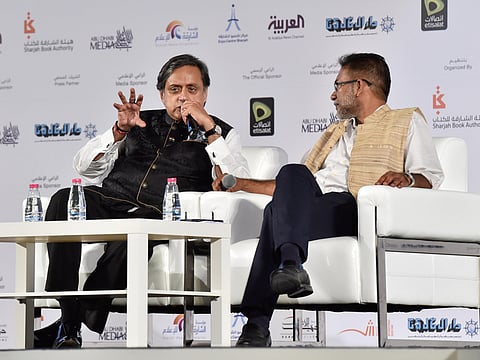Off the Cuff: Searching for the meaning of words
‘Say what’? say Netizens when the likes of Shahi Tharoor tweet

Whenever one Indian politician makes a comment on social media, everyone is forced to open their dictionaries to decipher what he is talking about.
Shashi Tharoor is the erudite gentleman, who was earlier a diplomat, and is a writer who writes in English, a language that many Indians have a love-hate relationship with because of the country’s colonial past.
He chooses Twitter — a modern-day communication platform to expound, where you are forced to cut out wordiness, as it allows you to say what you have to say in as many characters, and is a platform that ignores the age-old norms of English grammar. (Recently, Twitter doubled the number of characters from 140 to 280, most probably to give US President Donald Trump, more space for his pronouncements).
When Tharoor’s colleague in the Congress Party, P Chidambaram, a former union minister, was arrested, rather unceremoniously, over a media case, Tharoor expressed his support for him, speaking about his strength and courage and how he felt the fellow politician was facing character assassination.
So far so good, as everybody could understand what he was saying. But then, he could not hold his feelings in check.
“I believe justice will prevail in the end. Till then we will have to allow some malicious minds their Schadenfreude.” he said.
You could picture Tharoor when he is thundering out this statement; one hand on his hip and the other arm in the air, his fingers dancing about, making disdainful gestures as he hurls disgust at the opposition.
I had a relative like that, a cute elderly gentleman who used flowery turn of phrases and used the most obscure words, ones that may have been used in medieval times in England, at a time when knights and dragons roamed the earth.
I also suspect he got his felicity with words from reading court cases in newspapers. “He does not have any locus standi,” he would say suddenly, speaking about a politician.
Linguists and language teachers say that the best way to learn a language is to immerse oneself in the society and read local newspapers and watch TV programmes. But I doubt you will ever learn English reading English-language newspapers in India.
Imagine on your first day in India, you open the newspaper and read this headline: ‘TN ready for DMK-AIADMK face-off’.
Or read about this judgement on a corruption case: “The common day experiences indeed do introduce one with unfailing regularity, the variegated cancerous concoctions of corruption with fearless impunity gnawing into the frame and fabric of the nation’s essential.”
Back to Tharoor, and the moment he made the statement, a reporter whipped out the dusty, moth-bitten dictionary that is usually placed unobtrusively on the editorial desk, and reported that Schadenfreude is a word of German origin.
He explained the word means, ‘pleasure derived by someone from another person’s misfortune’, and the Netizens stopped scratching their heads.
It is not just politicians who try to confuse people. As the Indian economy is in a tailspin, a member of the monetary policy committee, Chetan Ghate, said, “estimates of economic growth in India have unfortunately been subject to a fair degree of floccinaucinihilipilification. Notwithstanding this, growth is likely to pick up.”
The Oxford dictionary describes the word as a rare one originating in the mid-18th century to describe the action of estimating something as worthless.
Then Reserve Bank of India Governor Das said, “I am not saying we maintain a Panglossian countenance and smile away every difficulty.” Being Panglossian is being extremely optimistic.
Many Indians are facing a host of issues today and top of that politicians and economists are giving them croochie-proochles with their English.
Mahmood Saberi is a storyteller and blogger based in Bengaluru, India. Twitter: @mahmood_saberi


